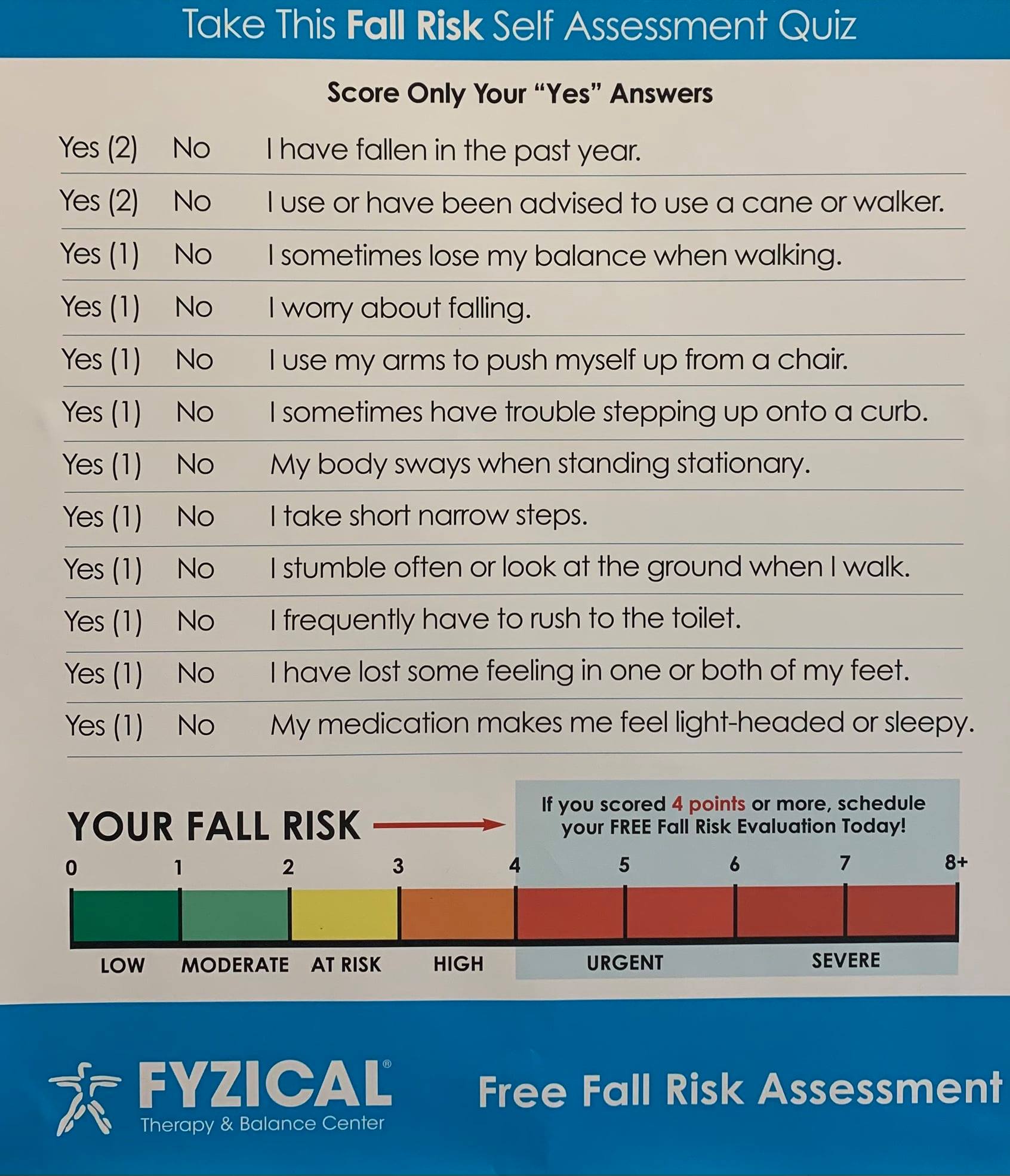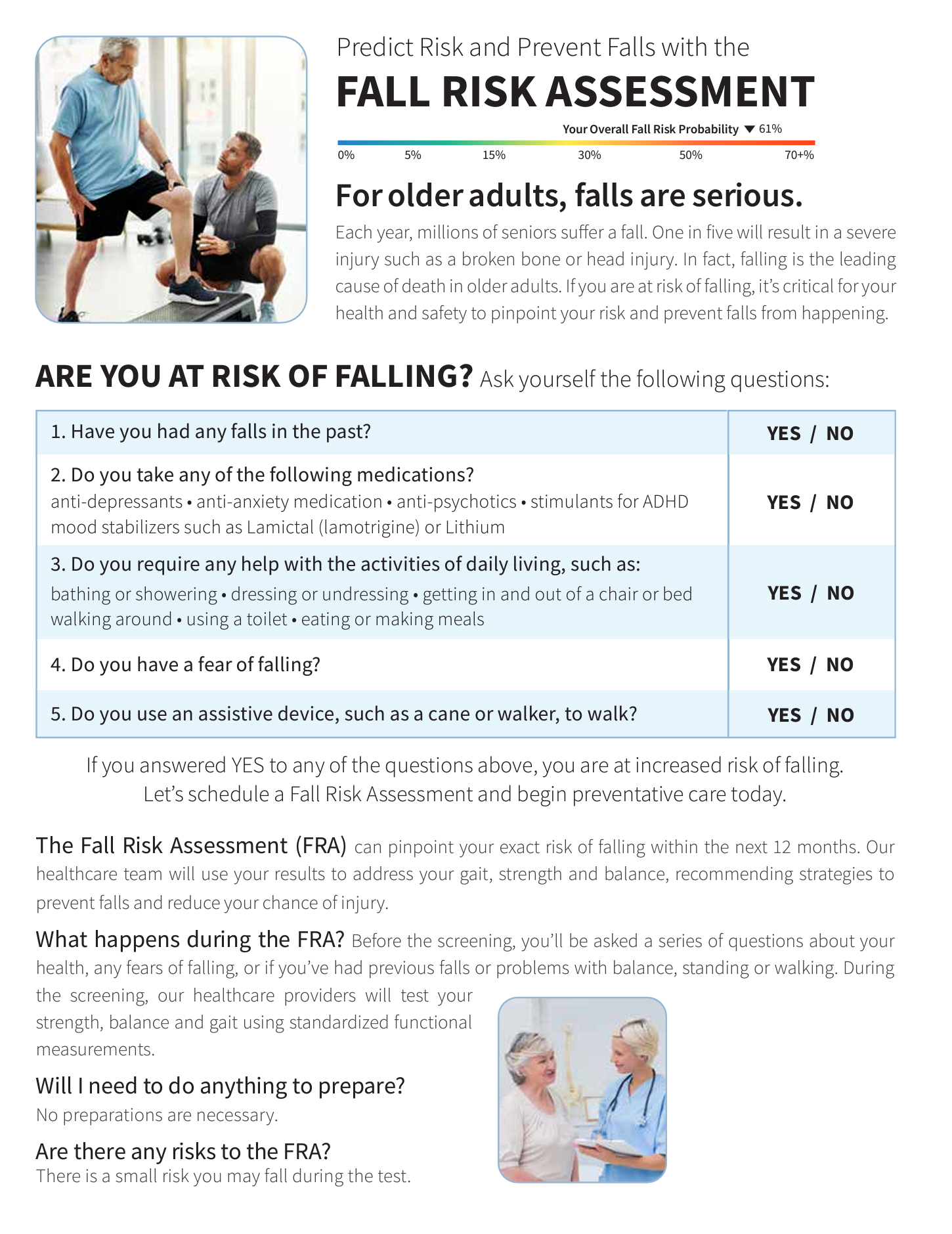The smart Trick of Dementia Fall Risk That Nobody is Talking About
Table of ContentsTop Guidelines Of Dementia Fall RiskThe Definitive Guide for Dementia Fall RiskThe smart Trick of Dementia Fall Risk That Nobody is DiscussingThe Ultimate Guide To Dementia Fall RiskGetting The Dementia Fall Risk To Work
Make certain that there is a marked location in your clinical charting system where staff can document/reference ratings and record pertinent notes related to drop avoidance. The Johns Hopkins Autumn Danger Evaluation Tool is one of several devices your team can make use of to aid protect against unfavorable medical events.Person falls in healthcare facilities are typical and debilitating adverse events that linger despite decades of initiative to minimize them. Improving interaction across the assessing registered nurse, treatment group, person, and individual's most included loved ones may strengthen fall prevention efforts. A team at Brigham and Women's Healthcare facility in Boston, Massachusetts, looked for to create a standard autumn avoidance program that focused around boosted interaction and client and household engagement.

The technology team stressed that successful application depends on person and personnel buy-in, combination of the program into existing workflows, and fidelity to program processes. The team kept in mind that they are coming to grips with exactly how to make sure continuity in program implementation during durations of crisis. During the COVID-19 pandemic, as an example, an increase in inpatient falls was connected with restrictions in client involvement along with limitations on visitation.
The Definitive Guide for Dementia Fall Risk
These cases are typically taken into consideration avoidable. To carry out the treatment, companies need the following: Access to Fall ideas resources Loss TIPS training and retraining for nursing and non-nursing staff, including new registered nurses Nursing workflows that permit for client and household engagement to carry out the drops evaluation, guarantee use of the avoidance strategy, and perform patient-level audits.
The outcomes can be very damaging, typically accelerating person decrease and creating longer healthcare facility keeps. One research study estimated remains enhanced an added 12 in-patient days after a client autumn. The Fall TIPS Program is based upon interesting clients and their family/loved ones throughout three major procedures: assessment, personalized preventative interventions, and auditing to make certain that people are engaged in the three-step loss prevention process.
The patient assessment is based upon the Morse Fall Range, which is a validated autumn risk analysis device for in-patient hospital settings. The range includes the 6 most common reasons clients in hospitals fall: the individual visit this site right here fall background, high-risk conditions (including polypharmacy), usage of IVs and other exterior devices, psychological condition, gait, and wheelchair.
Each danger factor relate to several actionable evidence-based treatments. The nurse creates a plan that includes the interventions and shows up to the care team, client, and household on a laminated poster or printed visual help. Registered nurses develop the strategy while consulting with the patient and the individual's family members.
Not known Details About Dementia Fall Risk
The poster acts as a communication tool with other members of the client's care team. Dementia Fall Risk. The audit component of the program includes assessing the patient's expertise of their threat elements and avoidance plan at the device and hospital degrees. Registered nurse champions perform a minimum of five private interviews a month with individuals and their families to look for understanding of the fall avoidance plan

An estimated 30% of these falls result in injuries, which can vary in seriousness. Unlike other damaging occasions that call for a standardized scientific action, fall avoidance depends very on the needs of the patient.
See This Report on Dementia Fall Risk

Based upon auditing results, one website had 86% conformity and 2 websites had more than 95% conformity. A cost-benefit analysis of the Fall suggestions program in eight hospitals approximated that the program price $0.88 per patient to execute and caused savings of $8,500 per 1000 patient-days in direct prices associated with the prevention of 567 drops over three years and 8 months.
According to the development group, companies thinking about carrying out the program needs to carry out a readiness evaluation and drops prevention gaps evaluation. 8 In addition, organizations must guarantee the required infrastructure and workflows for application and create an application strategy. If one exists, the organization's Fall Avoidance Job Force should be involved in planning.
Not known Details About Dementia Fall Risk
To start, companies ought to make sure completion of training components by registered nurses and nursing assistants - Dementia Fall Risk. Medical facility personnel ought to assess, based on the demands of a healthcare facility, whether to utilize a digital health document printout or paper variation of the fall avoidance plan. Applying groups should recruit and train nurse champs and develop procedures for auditing and reporting on fall information
Personnel require to be associated with the procedure of redesigning the process to engage clients and family in the analysis and avoidance plan procedure. Equipment should be in place to make sure that devices can comprehend why a fall took place and remediate the cause. A lot more specifically, registered nurses ought to have networks to give ongoing comments to both personnel and unit leadership so visit this web-site they can adjust and enhance fall avoidance operations and connect systemic issues.